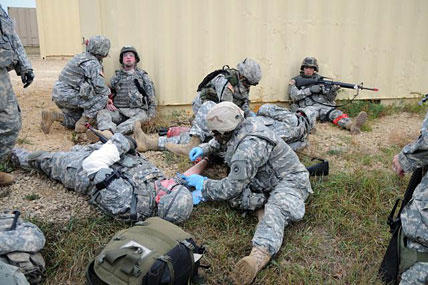Fort Benning, Ga., officials fired back Tuesday at a powerful animal rights group, characterizing the organization’s claims that live goats suffered agonizing treatment during a recent medical exercise as “unfounded.”
The allegations, leveled by the People for the Ethical Treatment of Animals, or PETA, centered on pre-deployment training for Army medics with the 14th Combat Support Hospital who participated in Brigade Combat Team Trauma Training at Benning July 16-20.
A whistleblower reported to PETA officials that “participants hacked off live goats' limbs with hatchets and tree trimmers and cut the animals apart with deer-skinning knives. … Some goats were ‘screaming for their lives’ during this ordeal -- a clear indication that they were conscious and able to feel pain,” according to a July 24 press release from PETA.
After a review of the complaints, Benning officials released a July 31 statement to Military.com refuting the allegations.
“Recent complaints by PETA against the treatment of live animals at Fort Benning were reviewed by the Army Medical Department and determined to be unfounded. Throughout the training, veterinary personnel were onsite to ensure the animals were treated humanely, under general anesthesia during the entire event, and that proper methods were used,” read the statement.
Justin Goodman, associate director of laboratory investigations for PETA, said the complaints filed with Benning leadership and the U.S. Department of Agriculture are not the first the group has logged over military medical training involving live animals.
Goodman said PETA does not yet know the contracting company providing the training at Fort Benning. There are many of them around the country, he said.
One company, Tier 1 Group of Arkansas, was cited earlier this year after a whistleblower covertly recorded video of its trainers cutting up live goats as part of a Coast Guard training program at Virginia Beach.
Goodman said the company was cited by the USDA for violations of the animal welfare act for not properly anesthetizing the animals.
The group subsequently used some of the video as part of a public awareness campaign that features filmmaker Oliver Stone, a Vietnam veteran. Stone says in the video that the U.S. military should have the best medical training, but that advances in life-like “human simulators” make the maiming of animals for training purposes unnecessary.
For PETA, the issue is not just about ensuring the animals are anesthetized. Goodman said PETA wants the live-animal trauma training ended entirely.
A bipartisan bill sponsored by 50 members of Congress would bar use of animals for such training, he said. The bill would require that training be done using human-like simulators, Goodman said.
Benning officials said that medics are exposed to all types of medical training before a combat deployment -- to include simulators -- but the Defense Department-approved, live tissue training is critical to the success of battlefield trauma training.
“Effective combat trauma training is a key reason for the more than 90-percent survival rate for soldiers wounded in action -- the highest in military history, according to Benning’s statement.



























